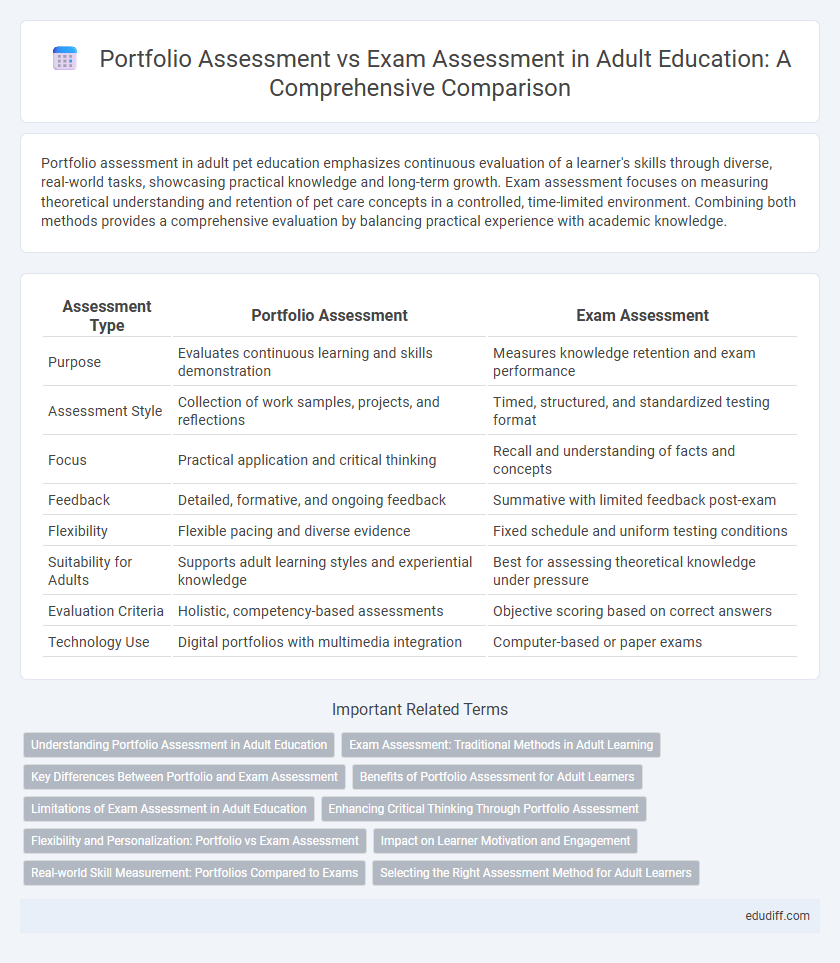Portfolio assessment in adult pet education emphasizes continuous evaluation of a learner's skills through diverse, real-world tasks, showcasing practical knowledge and long-term growth. Exam assessment focuses on measuring theoretical understanding and retention of pet care concepts in a controlled, time-limited environment. Combining both methods provides a comprehensive evaluation by balancing practical experience with academic knowledge.
Table of Comparison
| Assessment Type | Portfolio Assessment | Exam Assessment |
|---|---|---|
| Purpose | Evaluates continuous learning and skills demonstration | Measures knowledge retention and exam performance |
| Assessment Style | Collection of work samples, projects, and reflections | Timed, structured, and standardized testing format |
| Focus | Practical application and critical thinking | Recall and understanding of facts and concepts |
| Feedback | Detailed, formative, and ongoing feedback | Summative with limited feedback post-exam |
| Flexibility | Flexible pacing and diverse evidence | Fixed schedule and uniform testing conditions |
| Suitability for Adults | Supports adult learning styles and experiential knowledge | Best for assessing theoretical knowledge under pressure |
| Evaluation Criteria | Holistic, competency-based assessments | Objective scoring based on correct answers |
| Technology Use | Digital portfolios with multimedia integration | Computer-based or paper exams |
Understanding Portfolio Assessment in Adult Education
Portfolio assessment in adult education offers a comprehensive evaluation of learners' skills, knowledge, and growth through a collection of diverse artifacts such as projects, reflections, and work samples. Unlike exam assessment, which measures performance through standardized tests, portfolio assessment captures practical application and ongoing development, fostering deeper understanding and critical thinking. This method supports adult learners by providing a personalized and flexible evaluation approach that aligns with their real-world experiences and learning goals.
Exam Assessment: Traditional Methods in Adult Learning
Exam assessment in adult learning primarily utilizes traditional methods such as timed written tests, multiple-choice questions, and oral examinations to evaluate knowledge retention and comprehension. These methods emphasize standardized criteria, allowing for objective measurement of learners' understanding against predefined benchmarks. Despite criticism for limiting assessment scope, traditional exams remain prominent due to their scalability, ease of administration, and alignment with credentialing requirements in adult education programs.
Key Differences Between Portfolio and Exam Assessment
Portfolio assessment evaluates a learner's comprehensive body of work over time, highlighting skills, creativity, and progress, while exam assessment measures knowledge through timed, standardized testing. Portfolios emphasize continuous reflection and practical application, whereas exams focus on recall and performance under pressure. The key difference lies in portfolio's holistic, formative approach compared to the summative, often one-off nature of exams.
Benefits of Portfolio Assessment for Adult Learners
Portfolio assessment offers adult learners a flexible, personalized evaluation method that showcases their skills and knowledge over time, reflecting real-world applications. It encourages self-reflection and continuous improvement, enabling learners to track their progress and identify strengths and areas for growth. This approach reduces test anxiety commonly associated with exam assessments, fostering deeper engagement and motivation in adult education settings.
Limitations of Exam Assessment in Adult Education
Exam assessment in adult education often fails to capture the diverse experiences and practical skills that adult learners bring to the classroom, limiting its effectiveness as a sole evaluation method. Time constraints and high-pressure environments associated with exams can hinder the performance of adults who balance education with work and family responsibilities. Furthermore, exams typically assess rote memorization rather than critical thinking or real-world application, which are crucial for adult learners' success.
Enhancing Critical Thinking Through Portfolio Assessment
Portfolio assessment fosters critical thinking by encouraging reflective practice, self-evaluation, and continuous learning, making it more effective than traditional exam assessments. By compiling diverse work samples over time, learners analyze their progress and identify areas for improvement, enhancing metacognitive skills crucial for adult education. This method supports deeper understanding and problem-solving abilities, aligning with adult learners' needs for practical and applied knowledge.
Flexibility and Personalization: Portfolio vs Exam Assessment
Portfolio assessment offers greater flexibility by allowing adult learners to showcase diverse skills and experiences over time, adapting to individual learning styles and paces. Exam assessment typically follows a fixed format and schedule, limiting personalization and the ability to reflect practical, real-world abilities. Portfolios enable continuous, tailored evaluation that aligns more closely with adult learners' goals and life commitments.
Impact on Learner Motivation and Engagement
Portfolio assessment fosters continuous reflection and personalized feedback, enhancing learner motivation and sustained engagement by showcasing progress over time. Exam assessment often creates high-pressure situations that can increase anxiety and reduce intrinsic motivation, potentially leading to disengagement. Emphasizing portfolio approaches supports deeper learning and self-regulation, crucial for adult learners seeking meaningful skill development.
Real-world Skill Measurement: Portfolios Compared to Exams
Portfolio assessments offer a comprehensive evaluation of real-world skills by showcasing practical applications and ongoing projects, unlike exams that primarily test theoretical knowledge under time constraints. They provide deeper insights into critical thinking, problem-solving, and creativity through diverse, authentic tasks reflecting workplace scenarios. This approach better aligns with adult learning needs by emphasizing applied competence and continuous growth rather than rote memorization.
Selecting the Right Assessment Method for Adult Learners
Portfolio assessment allows adult learners to demonstrate skills and competencies through real-world projects and reflective practices, providing a comprehensive view of their capabilities over time. Exam assessments offer a structured evaluation of theoretical knowledge under timed conditions, suitable for measuring specific learning outcomes efficiently. Choosing the right assessment method depends on the learner's goals, with portfolios supporting applied skills development and exams aiding in benchmarking academic proficiency.
Portfolio assessment vs Exam assessment Infographic

 edudiff.com
edudiff.com